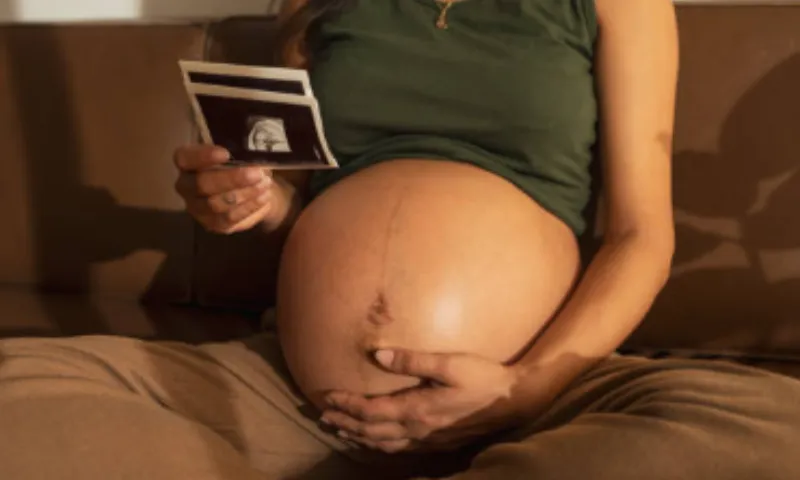
A comprehensive guide to the tests and developmental phases that take place during pregnancy. It’s amazing to watch your pregnancy grow week by week, and every stage of pregnancy is beautiful. Being prepared for the almost thrilling experiences that accompany each stage of pregnancy is essential. Its symptoms change with each passing week, so be aware of what’s ahead.
Read Also – Summer Hair Care: Flaunt Your Locks This Summer With These Expert Tips
Warm regards! Whether a lady found out via a lab test or a home pregnancy test, hearing the joyful news is both overwhelming and challenging for her. The term “foetus” refers to the stage during which your kid is developing and goes through many rapid changes. Actually, every week your baby reaches a new milestone and your body goes through certain important adjustments. The following happens during the 40 weeks of your pregnancy:
Weekly Pregnancy Guide: What to Anticipate During the Entire 40 Weeks
Pregnancy 0-4 Weeks:
Did you know that you start counting down to becoming pregnant even before you conceive? This is because your estimated due date needs to take into account the first day of the last menstrual cycle prior to conception. Fourteen days after ovulation, your period starts. If ovulation takes place and you try to conceive, your partner’s sperm will fertilise the mature egg that is released from the ovary. The fertilised egg goes down the fallopian tube and into the uterus after fertilisation, where it is implanted.
Read Also – Summer Skincare Tips For Different Skin Types
When the embryo installs itself inside the uterus and starts to grow at its fastest rate, your adventure as a mother begins. As a result, if you are not positive of the exact day of conception, your predicted due date is subject to change. Additionally, this is a great chance to address some frequently asked issues regarding safe measures to take, suggested fitness routines, and exercising throughout the first month of pregnancy.
Pregnancy Week 5:
Not only is your body producing more progesterone and oestrogen, but it is also secreting more hCG, or human chorionic gonadotropin hormone. Now, these hormones would be the primary source of most of your pregnancy annoyances, such morning sickness and aversion to certain scents. This is an excellent time to compile a list of essentials that every expectant mother should have in her purse, like antacids, prenatal vitamins, and anti-vomiting drugs. This is an important week for your baby’s development because it’s when the placenta and all other major organs mature.
Week Six of Pregnancy:
Your body and the developing foetus would both require an abundance of blood, which would explode into your system. Additionally, when the uterus pulls against the bladder, frequent urination may become necessary. Your baby’s heart should start beating this week and be seen on an ultrasound. This is the perfect chance to clear up any confusion you may have about pregnancy ultrasounds. In addition, this week marks the emergence of the baby’s facial features.
Pregnancy Week 7:
Your breasts should be plump and large by now, ready for breastfeeding. Given the increased levels of hCG, or human Chorionic Gonadotropin hormone, secreted by the body, constipation, fatigue, and food aversions should all worsen. This week is when your baby’s facial features start to show. The hands and legs start to protrude, and the development of the vital organs—the kidneys, liver, heart, intestines, pancreas, and appendix—occurs at an exponential rate.
Eighth Week of Pregnancy:
This week you may feel even more of the pregnant discomforts as the foetal growth progresses more fast. The development of the embryo into a baby, complete with distinct facial features, limbs emerging from the body, growing sexual organs, and a hardening of the skeletal system, is marked by a turning point this week.
Nineth Week of Pregnancy:
This week, you’ll begin to notice that you are gaining weight, and for good reason. The heart of your baby beats rapidly and has four chambers. Additionally, placental expansion may cause an increase in your hormone levels and metabolism.
Week Ten of Pregnancy:
Your belly might be sticking out a little bit, and you might be working a little slower than usual, but don’t lose your cool. Your child’s critical organs have all fully matured at this point. The kidneys, lungs, heart, intestines, and brain are growing and developing faster in addition to cooperating with each other. The growing baby’s skeletal structure is strengthened by the developing bones and cartilages.
Week Eleven of Pregnancy:
You will have gained a few kilogrammes at the very least despite the regular episodes of nausea and vomiting, and your tummy will protrude a bit more than it did the previous week. When the placenta receives fresh blood cells, it grows quickly. In terms of the offspring, the female foetus develops ovaries, and the male foetus forms testicles. It is possible to determine the child’s sex at this age. However, bear in mind that if you are in India, it is against the law.
Week Twelve of Pregnancy:
Some of your pregnancy symptoms, like morning sickness, fatigue, and nausea, will now go away. Heartburn and constipation attacks are still possible, though. The baby’s growth and development will eventually be impacted by the start of its own hormone production. White blood cells that the foetus is generating in huge quantities will shield your newborn from infection after birth. Another major development of the week is the creation of the vocal chords in the neck area.
Week 13 of Pregnancy:
Best wishes! It’s the end of your first trimester now. Vaginal discharge has emerged as a new and uncomfortable symptom now that the frequent urination has stopped. This is the outcome of increased oestrogen and blood flow in the pelvic area. The discharge keeps the normal bacterial balance in the vaginal area. Your baby’s intestines will start working at full capacity this week, and the pancreas will start producing insulin. As the abdominal cavity grows, the intestine travels around inside the abdomen.
Week 14 of Pregnancy:
The worst of your pregnancy symptoms are undoubtedly behind you, even if you may still notice dark spots and pimples on your face. Your protruding uterus is pushing out your stomach. Your baby will have more developed facial characteristics this week, allowing her to squint, grimace, scowl, and perhaps suck her thumb! This week, your baby will have a thin coat of hair covering her entire body rather than just her head. Your foetus is kept warm in the womb by its lanugo, or hair.
Week 15 of Pregnancy:
Even though you don’t seem much different from how you looked a week ago, you might have gained some weight by now and are probably starting to feel a little heavier than usual. Your baby’s senses will also begin to develop this week. You can now pat your belly gently and converse with your baby. This would also make your baby sensitive to light.
Week Sixteen of Pregnancy:
The weight increase phase began this week, and you might have gained two to five kilogrammes. Furthermore, your infant is developing a thin layer of fat under her skin that will act as an insulator to keep her warm and is playing with her very first toy, the umbilical cord.
Week Seventeen of Pregnancy:
Even if your baby bump is developing and you are probably loving the newfound delights of parenting, you should know that regular sonograms and medical exams will now be a part of your life. The most significant development of the week is the fingerprint pattern on your baby. This week, the heartbeat and pumping motion will become more coordinated as the unborn brain assumes control of cardiac function.
Week Eighteen of Pregnancy:
Your centre of gravity has moved slightly now that your abdomen is visible, requiring postural adjustment. Poor posture might now exacerbate existing backaches. Around week eighteen, your baby’s neurological system starts to rapidly develop. The neurons in the brain are currently making both simpler and new, more complicated connections.
Week 19 of Pregnancy:
The strain your expanding and projecting uterus places on the ligaments encircling and supporting it results in lower abdominal pain. The most recent development is that your baby’s little scalp has started to produce her own hair this week.
Week 20 of Pregnancy:
Now that you’re over your morning sickness, you can give in to hungry pains. But do not adopt the habit of dining for two. Make sure that nothing you eat is junk food; only wholesome food will do. As of this week, your baby’s ears are fully developed and functional. Talking to your child is an excellent approach to initiate the process of mother and baby bonding straight immediately.
Week 21 of Pregnancy:
This week, you might notice that your ankles and feet start to swell due to water retention, which can cause edoema. It may also be apparent on your palms and fingers. There’s no need to be concerned as this benign disease normally disappears shortly after delivery. Starting this week, your baby is probably going to taste the things you eat through amniotic fluid.
Week 22 of Pregnancy:
Hormonal shifts may cause you to see dark patches and changes in your face’s pigmentation this week. But your baby’s liver begins to release enzymes this week. These enzymes convert foetal red blood cells into bilirubin. The bilirubin finally leaves the body through urine after passing through the placenta and entering the mother’s bloodstream.
23rd Week of Pregnancy:
When the baby grows inside your womb and your tummy protrudes, your uterus pulls on your stomach, leaving your abdomen covered in ugly stretch marks. While you address the external stretch marks, your baby’s distinctive face features develop and her foetal body expands proportionately to her head. Underneath the epidermis, new fat cells are being added to keep her warm.
Week 24 of Pregnancy:
Indeed, beginning in week 24, Braxton Hicks contractions are possible. The uterine muscles contract, causing this to happen and pass swiftly. The tiny internal respiratory structures and surfactant that your unborn child’s lungs are already forming will help her breathe when she comes out of the womb.
Pregnancy Week 25:
Hormonal changes during pregnancy cause almost all physiological activities, including the cessation of hair loss. This explains why a lot of expectant mothers think that being pregnant makes their hair look fuller and more glossy. Blood vessels are starting to grow in your fetus’s lungs, indicating that they are coming closer to adulthood. Your baby’s nostrils also widen to allow for easier breathing. Since there is no air within the womb, your unborn kid will breathe in amniotic fluid, which is a wonderful preparation for breathing after delivery.
Week 26 of Pregnancy:
Remember that back aches, headaches, hand and foot pain, chest discomfort, lower back pain, and pelvic pain are all normal throughout pregnancy. You might experience some of these symptoms this week. Your baby’s eyelids are starting to open; they had been closed for a few months to allow the retina to fully mature so that it could help with focus, but the irises are still in the developmental stage.
Week 27 of Pregnancy:
As your due date approaches, you may experience intense hunger. This is quite obvious given that your body is screaming for additional energy and that your unborn child needs the proper nutrition for a healthy growth and development. But take care not to overindulge in food. This week, your baby’s brain development progresses due to the addition of new brain tissue. Many specialists believe that babies may begin dreaming during this period as well.
Week 28 of Pregnancy:
You might observe more foetal movements this week. This is the typical course that your pregnancy should take. If foetal movements are most active at night, this could potentially disrupt your sleep. Beginning this week and continuing through delivery, your baby will continue to gain weight. Most babies will be head-down by this week as they get ready to go into labour. If your sonography still shows that your baby is transverse or breech, don’t worry; there’s still time for them to change into the correct position.
Week 29 of Pregnancy:
These days, mood swings brought on by the infamous hormone surges might be very distressing for you and your loved ones. You may feel tired too often, which worsens your mood, because you have acquired enough weight—roughly 10 kg or more. This week, your baby will be moving more and perhaps nuzzling you with its elbows and hands in addition to stretching its limbs within the womb. As labour draws near, these movements will decrease because of a lack of space in the womb.
Week Thirty of Pregnancy:
At this point, it is possible for your breasts to leak more often. Your baby’s bone marrow has started to make red blood cells at this point. This week, your baby will accomplish this milestone. This implies that in the unlikely event that you go into labour, your unborn child will be able to survive on its own.
Week Thirty-One of Pregnancy:
The pressure of the bulging uterus on the bladder may cause frequent impulses to urinate. Furthermore, you can sneeze, cough, or laugh and cause leaking. During this week, your baby’s finger and toenail growth is an important development.
Week 32 of Pregnancy:
You would then go on to gain up to 500 g every week until labour began. In a healthy pregnancy, you can gain one to two kilogrammes every month during the third trimester. Most babies will be heads-down, or with their head resting on the bottom of the uterus, by the time they are 32 weeks old.
Week 33 of Pregnancy:
It’s not unusual to have insomnia during the third trimester. It is difficult, among other things, to acquire comfortable, deep sleep for prolonged periods of time because of the bulging abdomen, excess weight, increased movements of the foetus, and fatigue. The antibodies your unborn kid is currently acquiring and developing into their immune system will help shield them from infections once they are born.
Week 34 of Pregnancy:
Many women report having cloudy vision during this period due to internal hormonal changes. However, this is just a transitory problem that will disappear shortly after birth. All of your baby’s critical organs are now fully grown and functioning independently, with the exception of the lungs. The lungs of your newborn fully grow the moment they inhale fresh air.
Week 35 of Pregnancy:
Your tummy will continue to swell and extend outward as your baby gains weight and lengthens. Your uterus is particularly touch-sensitive at this point, about six inches above your belly button. Your baby’s kidneys and liver are completely formed and able to get rid of waste on their own. You may experience more foetal kicks now that your baby has less space to move about.
Week 36 of Pregnancy:
As you approach full-term pregnancy, your uterus will have stretched at this stage, and you might have gained 10 to 12 kg throughout these months. Every day that passes strengthens the baby’s other bones and cartilage, but the skull remains flexible, enabling a seamless vaginal birth during labour. But this does not mean that the remaining bones become rigid and hard. They can still be twisted to help your baby pass through the opening in the vagina.
Week 37 of Pregnancy:
Now that your baby is in the labor-ready position, with its head resting on the pelvic floor, you may feel more pressure and pain in that area. As the due date approaches, your baby will continue to practise breathing techniques by breathing in and out through their nostrils while amniotic fluid is still inside them.
Week 38 of Pregnancy:
Having greater vaginal discharge during this period is typical and indicates that your cervix is dilating and preparing to give birth. Your infant is still gaining weight even if they are now completely hairless. As such, your baby’s skin gets plumper and smoother. Don’t worry if you can’t sit or sleep comfortably; this is normal!
Week 39 of Pregnancy:
If you have never had false contractions or Braxton Hicks, you might this time. However, you should be able to differentiate between indications of early labour and phoney contractions. During these last few days, your baby develops enough subcutaneous fat to help with weight increase and to help control body temperature.
Week Forty of Pregnancy:
You could give birth at any time, therefore your gynaecologist and prenatal expert will encourage you to start counting the baby’s movements now! This will be remembered from your 40th week (if it happens on schedule). But be aware of the labour indicators. In certain circumstances, back pain may be the first sign of labour. If labour starts on time this week, you will be able to hold your tiny bundle of joy in your arms. This is a great time to become knowledgeable about labour and delivery! When your kid is delivered, they might weigh 2.5 to 3.5 kilogrammes or even more. Best wishes! Your child is indeed a gift.
About Latturam – latturam.com is a platform to know some facts about nature, history, health, environment and our lifestyle.
Read Also – The Top 5 Foods High In Zinc To Boost Hair Growth In The Summer



Comments